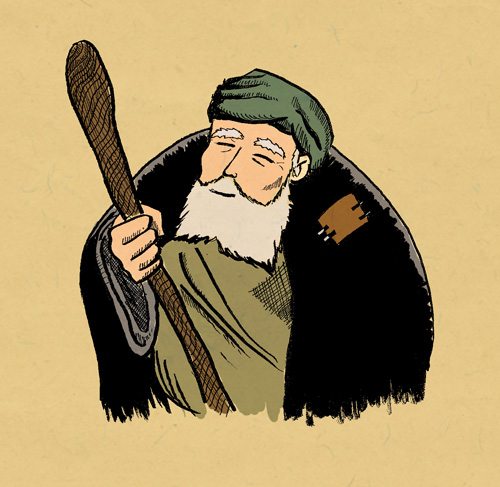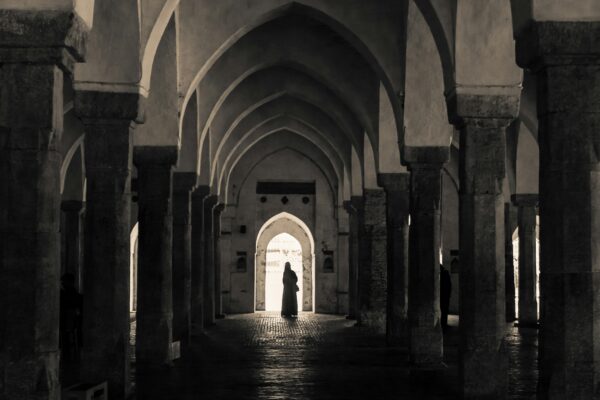Comedy is dangerously effective, and Bahlool is proof of this.
Comedy is dangerously effective, and Bahlool is proof of this.
Wahab ibn Amr –commonly known as Bahlool– is a person whose stories has graced us with intellectual gems that masqueraded behind a genius mask of folly. What I am about to discuss is an attempt to place Bahlool on the high pedestal he deserves.
We have accounts of so many real characters throughout history –maybe even more fictional characters in pop culture– who faked their own insanity. In literary fiction, for example, William Shakespeare has a special type of complex characters named after him who are known for their theatrical comic relief. They’re referred to as Shakespearean fools. From recent history, ‘One Flew Over the Cuckoo’s Nest is also a classic fictional example and a personal favourite. However, the common plot for such characters to act cuckoo is to dodge doing some jail time for having a nonwashable reputation of being master crooks. They wisecrack their way out of murder basically.
Bahlool’s stories are on a whole different level though. They are timeless for two reasons:
1. They are non-fictitious.
2. They turn the common wise-fool plot on its head. Bahlool faked insanity to do good. He wore insanity as a way to expose injustice, help others and propagate knowledge through comical yet sharp wit.

Before acting crazy, Bahlool was a man of stature; a prominent judge, a well-known scholar, and a poet. People flocked to attend his lectures. It all started when the Abbasid caliph of the time Haroon Al Rashid ordered a crackdown on anyone following the Ja’fari school of thought. To conceal his ideology and stay away from the wrath of the caliph, Bahlool wore rags and started riding a stick on the streets of Baghdad, pretending it was his horse. The plot thickens. Haroon and Bahlool are actually cousins.
To be historically fair, Bahlool wasn’t the first nor the only person to play the crazy card to manoeuvre tyranny. Al-Naysaburi’s Uqala’a Almajaneen –Wise Madmen– niche of a book lists a collection of reports about men and women in Islamic history who were thought of as mad. Still, Bahlool remains the most popular and the master of this genre for his truly wise and awe-inspiring stories. His stories are many, but like anything historical, some are credible and some are not. In 2007, a Syrian media company turned his stories into a 3-seasons TV series. A collection of Bahlool’s stories has also been beautifully illustrated into a comic book by Sufi Comics.
The punch lines of Bahlool’s well-staged replies mostly have a spiritual outlook, but they also address ethical and philosophical questions like free-will and predestination. To me, the fascinating aspect of Bahlool’s stories is the pragmatic feet-on-the-ground approach to answer and help people. The markets of Baghdad were a sea of fraud and dishonesty, yet it was his playground. He schemed quick practical solutions to help fraud victims get their rights back from deceitful merchants, placing a direct threat to the scam artists.
And it wasn’t just the markets. The caliph loved to invite Bahlool to his place to listen to him goof around. Haroon Al Rashid actually ordered his men to allow Bahlool —and his stick horse— to enter his palace anytime he pleased. So, Bahlool satirised his –if I may call them– skits with ironic, sarcastic exhortations to do good. He put many smarties in their place, placing a threat on them too. In short, he wasn’t preaching from an ivory tower. The comedy was a means, not the goal. Attention and admiration only came naturally as a by-product. That’s why people in the markets and in the caliph’s palace were always suspicious of his insanity.
As a person, I am not someone who is easily entertained, and I admit to being a dry boring person, but I understand the power of comedy and why humour matters a big deal. It teaches us not take ourselves too seriously. It is uplifting and it treats us sometimes better than any medicine can (this is a reference to Patch Adams). Bullies also understand it. They cop-out humour to childishly belittle and ridicule others – and their mamas too.
So comedy is dangerously effective; it can improve lives like it can crush lives. Successful comedians use it as a vehicle to challenge people’s beliefs and prejudices while providing serious commentary on social issues. It’s amazing how comedy provokes critical thinking. However, comedy alone, if not coupled with applicable pragmatic actions to fix the laughable ironic matter, it’s just plain depressing. It’s the reason why Jon Stewart quit The Daily Show and grew a beard.
“I live in a constant state of depression. I think of us as turd miners. I put on my helmet, I go and mine turds, hopefully I don’t get turd lung disease.” – Jon Stewart
“Irony is singularly unuseful when it comes to constructing anything to replace the hypocrisies it debunks.” – David Foster Wallace






